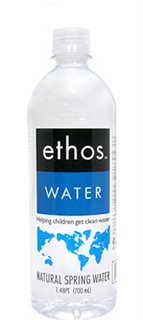Unethical Ethos

I wondered into a Starbucks this morning because I didn't want to eat the really bad breakfast food at my hotel. You know, the kind you find at almost every American chain hotel: boxed cereal, a piece of fruit, donut, cheap bread, etc. There was a Starbucks nearby and I got a hot muffin with eggs, cheese, and spinach. It was very good and I had it with a cup of chai tea with soy milk. Not bad at all. As I was waiting for my sandwich I see a basket full of bottled water called Ethos. A sign on top of it said, something along the lines of, that your purchase helps people in developing countries get clean water, and that over a billion people do not have access to clean water.
Immediately, my bullshit radar went into overdrive, especially after reading that mainstream media reports about last year’s Starbucks’ $8 million purchase of Ethos were positive (Business Week, USA Today, NY Times). Here's my conclusion: it's a gimmick to make money and it's unethical. I base my opinion on the following:
1) $.05 of every $1.80 or $1.85 purchase is donated, that's less than 3%. The goal is to donate $10 million over the next five years. Only $250,00 was donated in 2005. It would take over 200 million bottles to reach $10 million.
2) Ethos/Starbucks doesn't actually get involved in any of the projects, as far as I can tell by reading the descriptions of "their" projects in each country. They're all run by charitable organizations such as WaterAid, MercyCorps, etc., or UNICEF, which means that Starbucks made an agreement to give them cash and in turn they could share credit for the work. See Ethiopia or Honduras as examples.
3) Now, you might say $.05 is better than nothing, right? Well, what are the environmental impacts of producing and disposing 200 million bottles? Additionally, what would happen if you gave your $1.85 to any of those organizations instead of to Starbucks? I found an interesting comment about it here (scroll down):
If a consumer were to donate the $1.85 purchase price for a bottle of Ethos water to www.wateraid.org, or CARE International, then get their drinking water from the tap, there would be a heck of a lot more impact than the $.05 that Starbucks will donate.
In addition, there would be much less of an impact on the environment. Did you know that a huge amount of water is consumed when manufacturing plastic bottles? 17.5 kg of water is used to make 1 kg of PET (the plastic). Additionally, in the U.S., 30 million plastic water bottles go into landfills in the U.S. EVERY DAY.
Also - Ethos has a bottling plant in Phoenix, AZ. I don't know about you, but it seems a little screwed up to me that water is being bottled in the desert, then shipped all over the U.S., and possibly the world.
If Starbucks really cared about the issue, they'd do a lot more good by just having a donation box to one of those organizations in their stores. Starbucks' response might be, "We're not a charity!" My response: exactly, you're in the business of making money, so why are you making profits off a charitable issue? I have no problem with Starbucks making money, but not off a plea for charity! And they're probably doing more damage than good, as per the previous point above.
4) The original founders of Ethos are businessmen who went into the business to make money. One guy was a McKinsey consultant, the other was in a VP for a real-estate Web site.
5) The language on the Starbucks Web site (and I think at the store) uses scare tactics:
Currently, more than 1 billion people worldwide, or 20 percent of the world’s population, lack access to clean drinking water. Water-related diseases are the leading cause of death among children around the world, taking a life every 14 seconds.
I don't look at it as Starbucks "bringing an important issue to light." Like I said, if you really care about the issue, just donate the money to WaterAid or another organization where you'll make a bigger difference.
Corporations are pretty big sponsors of charities - about $1.38 billion in 2005 (individuals gave $260 billion). It's wonderful when Google sponsors Nova or Wal-Mart gives a donation to the United Negro College Fund. But that's very different from making profits off an important issue and possibly polluting the environment at the same time!


No comments:
Post a Comment